Unlock new revenue streams with the right B2B commerce platform! Discover the 8 best solutions that empower businesses to enhance customer experiences, streamline operations, and boost sales. Transform your B2B strategy and watch your profits soar!
8 Best B2B Commerce Platforms to Unlock New Revenue
In today’s rapidly evolving digital landscape, B2B commerce is no longer just a transactional necessity; it has transformed into a powerful engine for innovation and growth. As businesses strive to unlock new revenue streams and enhance customer experiences, selecting the right B2B commerce platform becomes crucial. The right platform can empower organizations to streamline operations, personalize offerings, and reach new markets with unparalleled efficiency.
In this article, we will explore the 8 Best B2B Commerce Platforms that are not just tools, but gateways to new opportunities. These platforms are at the forefront of the digital commerce revolution, equipped with cutting-edge features designed to elevate your business to new heights. Whether you’re a seasoned enterprise or an emerging player in the market, investing in the right B2B solution can unlock your potential and inspire growth. Join us as we delve into these transformative platforms and discover how they can help you navigate the complexities of B2B commerce while maximizing your revenue potential. Your journey toward unlocking new revenue begins here!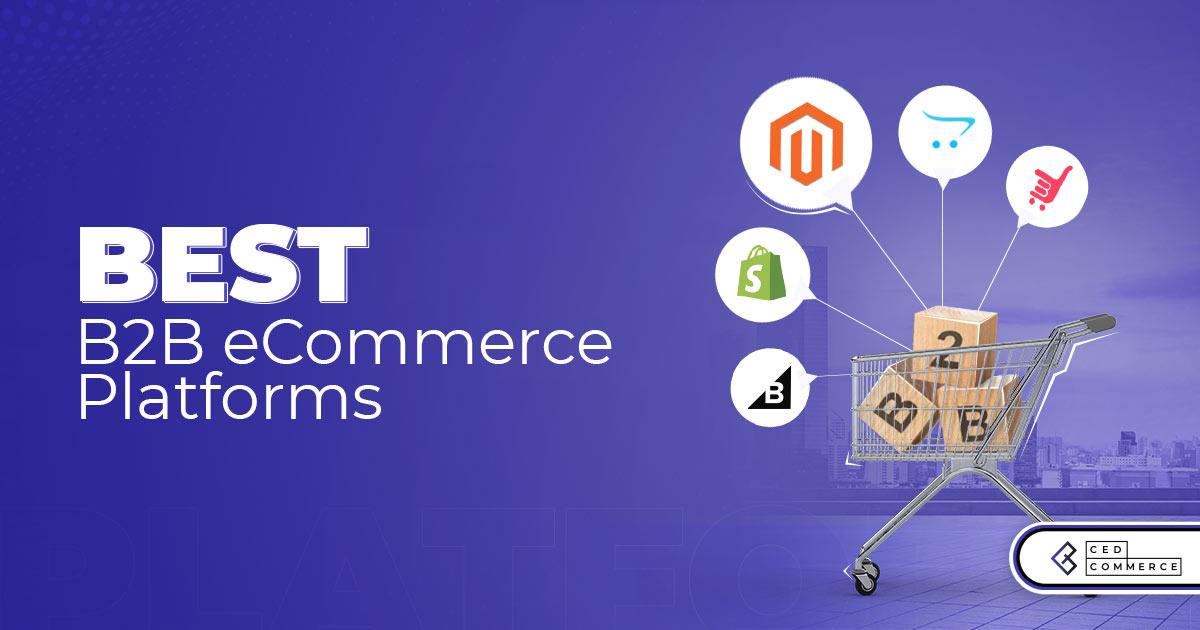
Exploring the Future of B2B Commerce Platforms
As businesses evolve in the digital age, the landscape of B2B commerce platforms is transforming at an unprecedented pace. Companies are increasingly seeking innovative solutions to streamline their operations, enhance customer experiences, and unlock new revenue streams. In this dynamic environment, selecting the right B2B commerce platform can be a game-changer, enabling organizations to thrive amidst competition.
Scalability is a crucial factor for any B2B commerce platform. As businesses grow, their needs change. Scalable platforms allow companies to adapt their operations without the hassle of switching systems. This flexibility ensures that businesses can meet increasing demand while maintaining efficiency and cost-effectiveness. Leading platforms offer modular features that enable users to expand functionalities as their operations evolve.
Another vital aspect is integration capabilities. The ability to seamlessly integrate with existing business systems—such as ERP, CRM, and inventory management—is essential for maximizing productivity. A robust platform can bridge various technologies, allowing for data consistency and a unified user experience. This integration not only enhances operational efficiency but also fosters better decision-making through real-time data visibility.
In this era of personalization, platforms that offer customizable user experiences are gaining traction. B2B buyers expect tailored interactions, and platforms that allow businesses to create personalized catalogs, pricing, and promotions stand out. This capability not only boosts customer satisfaction but also drives loyalty and repeat purchases, ultimately contributing to sustained revenue growth.
| Feature | Importance |
|---|---|
| Scalability | Facilitates growth without disruption |
| Integration | Ensures seamless data flow across systems |
| Customization | Enhances user experience and drives loyalty |
| Analytics | Offers insights for informed decision-making |
Moreover, advanced analytics capabilities are essential for understanding customer behavior and market trends. Platforms equipped with robust analytical tools enable businesses to gain insights into buyer preferences, sales cycles, and product performance. By harnessing these insights, organizations can make data-driven decisions to optimize their strategies and enhance overall performance.
Investing in the right B2B commerce platform is not just about technology; it’s about envisioning the future of commerce. By embracing innovative solutions and prioritizing features that matter, businesses can position themselves for success. The right platform will not only streamline operations but unlock pathways to new revenue opportunities, redefining the way B2B transactions are conducted.

Transform Your Business with Cutting-Edge Technology
In today’s fast-paced digital landscape, embracing innovative technology is essential for B2B businesses looking to thrive. The right platform can streamline operations, enhance customer experiences, and ultimately unlock new revenue streams. Below, discover the eight most effective B2B commerce platforms designed to propel your business forward.
Key Features to Consider
When evaluating B2B commerce platforms, keep an eye out for features that will maximize your efficiency and adaptability:
- Scalability: Choose a platform that can grow with your business needs.
- Customization: Ensure the platform allows for tailored solutions that fit your unique operational requirements.
- Integration: Look for seamless integrations with existing systems for streamlined processes.
- User Experience: A user-friendly interface can significantly improve customer satisfaction and retention.
Top B2B Commerce Platforms
Here’s a glimpse of some leading platforms that can transform your B2B commerce strategy:
| Platform | Key Highlight | Ideal For |
|---|---|---|
| Shopify Plus | High scalability and multi-channel selling | Growing enterprises |
| BigCommerce | Robust built-in features | Businesses seeking extensive customization |
| Magento Commerce | Advanced customization capabilities | Large enterprises with complex needs |
| Salesforce B2B Commerce | Seamless CRM integration | Businesses prioritizing customer relationships |
| Odoo | Comprehensive suite of business applications | Small to medium businesses |
| WooCommerce | Highly customizable eCommerce solution | WordPress users |
| SAP Commerce Cloud | Enterprise-level solutions with global reach | Multinational corporations |
| Oracle CX Commerce | Data-driven insights for better decision making | Data-centric businesses |
Each platform offers distinct advantages tailored to varying business needs. By assessing the unique features of each, you can find the perfect fit that aligns with your goals and vision. The right choice will not only enhance your operational efficiency but also create a delightful purchasing experience for your customers.
Driving Innovation Forward
Investing in a robust B2B commerce platform is not just a technological upgrade; it’s a strategic move that can redefine your market position. By leveraging cutting-edge technology, your business can not only keep pace with competitors but also drive innovation and growth, ultimately unlocking new revenue opportunities and ensuring long-term success.
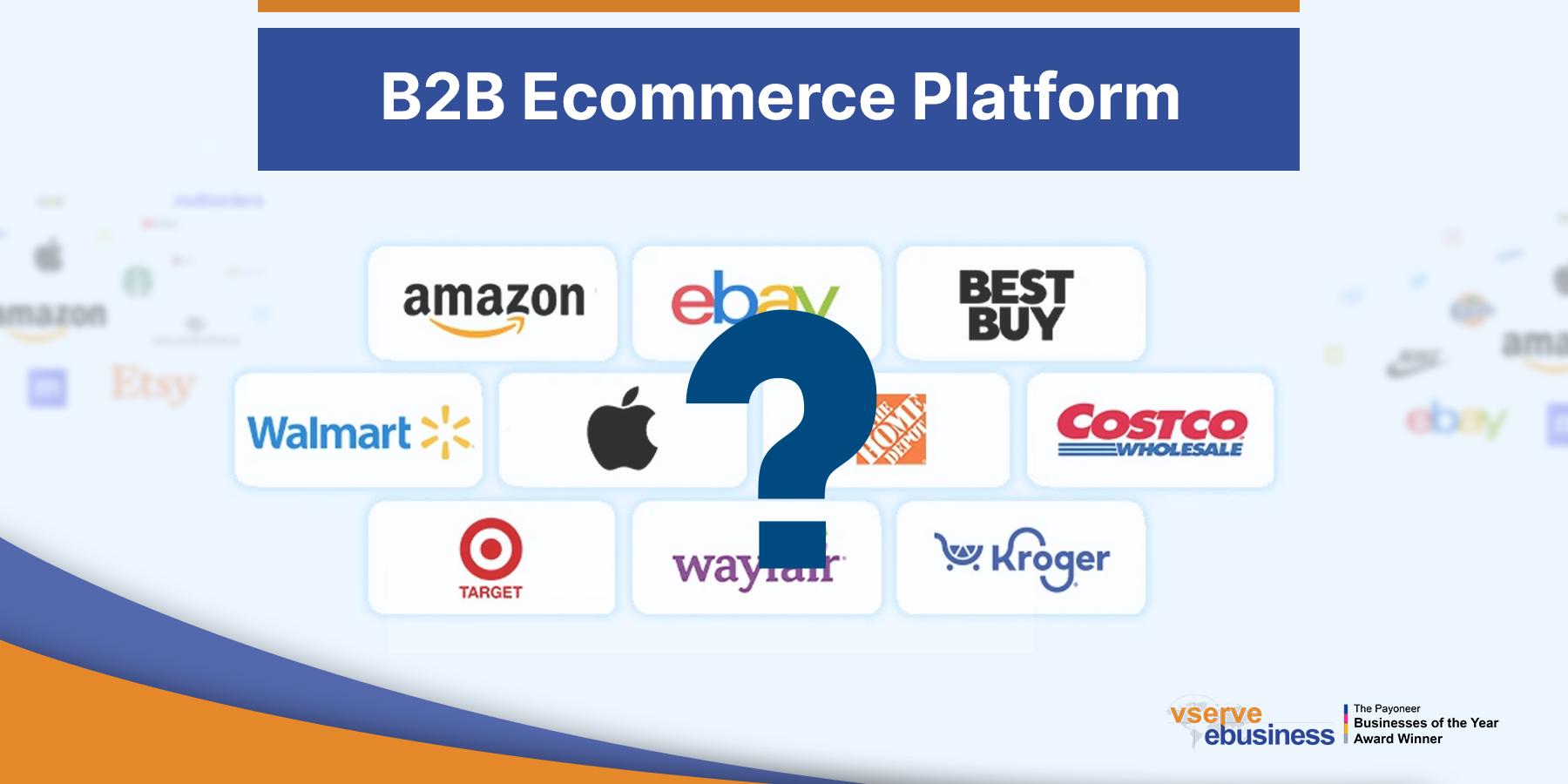
Key Features to Look for in a B2B Commerce Platform
When selecting a B2B commerce platform, it’s crucial to focus on features that not only enhance your operational efficiency but also improve the customer experience. Look for platforms that offer robust scalability options, allowing your business to grow without the need for significant system overhauls. As your customer base expands and product offerings increase, the right platform will adapt seamlessly to support your evolving needs.
Another important feature is integration capabilities. Your chosen platform should easily integrate with existing tools and systems such as ERP, CRM, and inventory management software. This will create a cohesive ecosystem that streamlines processes, improves data flow, and ultimately enhances productivity across your organization.
User experience is paramount in B2B commerce. Look for a platform that prioritizes intuitive design and easy navigation, ensuring that your buyers can find what they need without unnecessary friction. Customizable user interfaces and personalized experiences can significantly boost customer satisfaction and retention rates. A platform that offers advanced search functionalities, filtering options, and an optimized mobile experience is essential in today’s digital landscape.
Security features should not be overlooked. A trusted B2B commerce platform should offer robust security protocols, including PCI compliance, data encryption, and multi-factor authentication. Protecting sensitive customer information is not just about adhering to regulations; it’s about building trust in your brand.
Consider the analytics and reporting capabilities of the platform as well. Insightful analytics can provide you with crucial data on customer behavior, sales trends, and inventory management. This information is invaluable for making informed decisions and strategic planning that can drive growth and profitability.
ensure that the platform supports multiple payment options. B2B transactions can vary significantly from consumer sales, so offering diverse payment methods can help facilitate smoother transactions. Features such as credit terms, purchase orders, and subscription billing can also enhance customer convenience and loyalty.
| Feature | Importance |
|---|---|
| Scalability | Supports business growth without disruption |
| Integration Capabilities | Enhances operational efficiency |
| User Experience | Boosts customer satisfaction and retention |
| Security Features | Protects sensitive data and builds trust |
| Analytics and Reporting | Informs decision-making and strategy |
| Multiple Payment Options | Simplifies transactions and enhances convenience |

Unleashing the Power of Personalization in B2B Sales
In today’s competitive B2B landscape, the ability to offer personalized experiences can set your business apart from the crowd. Personalization in B2B sales isn’t just a luxury; it’s a necessity. By leveraging data and insights, businesses can create tailored experiences that resonate with individual buyers, leading to higher engagement and conversion rates.
To harness the power of personalization, consider these key strategies:
- Data-Driven Insights: Utilize analytics tools to gather information about customer behavior and preferences. This will allow you to segment your audience effectively and tailor your communications.
- Customized Content: Develop content that speaks directly to the needs of specific customer segments. This includes personalized emails, landing pages, and product recommendations.
- Dynamic Pricing: Implement pricing strategies that adapt based on customer profiles or purchase history, making your offers more appealing and relevant.
Moreover, integrating advanced technology into your B2B sales strategy can further enhance personalization efforts. Consider investing in platforms that offer:
- AI-Powered Recommendations: Leverage artificial intelligence to analyze customer data and provide personalized product suggestions.
- CRM Integration: Ensure that your customer relationship management system is connected to your sales and marketing tools to have a holistic view of customer interactions.
- Omnichannel Experience: Create a seamless experience for customers across all touchpoints, whether online or offline, to foster a stronger relationship.
For a visual representation of how personalization can transform your B2B sales, consider the table below that showcases the impact of personalized strategies:
| Strategy | Impact | Expected Outcome |
|---|---|---|
| Data-Driven Insights | Enhanced customer understanding | Higher retention rates |
| Customized Content | Increased engagement | Greater conversion rates |
| Dynamic Pricing | Improved sales effectiveness | Boosted revenue |
Ultimately, the key to unlocking new revenue streams lies in your ability to adapt and personalize. By leveraging the right B2B commerce platforms that support these initiatives, you can cultivate a powerful sales strategy that not only meets but exceeds customer expectations. With personalization at the forefront, your B2B business can thrive in an ever-evolving marketplace.
How Seamless Integration Can Elevate Your Operations
In today’s fast-paced digital landscape, the ability to integrate your B2B commerce platform seamlessly with existing systems can be a game-changer for your business operations. When your tools communicate effortlessly, you can focus on what truly matters: driving growth and enhancing customer satisfaction. A well-integrated platform not only streamlines processes but also empowers teams to work more efficiently.
Consider the advantages of choosing a B2B commerce platform that offers:
- Real-time data synchronization: Ensure that inventory levels, pricing, and customer information are always up to date across all channels.
- Automated workflows: Reduce manual tasks and errors by automating routine operations, from order processing to invoicing.
- Enhanced customer engagement: Leverage integrated analytics to better understand customer behavior and tailor marketing strategies accordingly.
Integration goes beyond just connecting systems; it paves the way for innovative solutions that can transform your business model. For instance, combining your commerce platform with a robust CRM system allows for a 360-degree view of customer interactions, enabling personalized service that can significantly boost loyalty and retention rates. Additionally, integrating with an ERP can optimize inventory management, reducing costs and improving service levels.
It’s essential to choose platforms that offer flexible APIs and support a wide range of third-party integrations. When your B2B commerce solution can easily connect with tools like payment gateways, logistics providers, and marketing automation software, you set the stage for unprecedented scalability. This agility helps you respond swiftly to market changes and customer demands.
As you evaluate your options, consider the following integration capabilities:
| Platform | Integration Features | Key Benefits |
|---|---|---|
| Platform A | API, CRM, ERP | Enhanced data accuracy |
| Platform B | Custom APIs | Tailored solutions |
| Platform C | Third-party plugins | Rapid deployment |
Ultimately, investing in a B2B commerce platform that prioritizes seamless integration is about positioning your business for future success. As you unlock new revenue streams, you’ll find that operational efficiency and customer satisfaction are no longer just goals but realities that set you apart in a competitive marketplace. Choose wisely, and let integration be the catalyst for your business transformation.

Maximizing Customer Engagement Through Innovative Solutions
In the realm of B2B commerce, choosing the right platform goes beyond mere transactions; it’s about elevating the customer experience and fostering deeper connections. Innovative solutions are designed to not only streamline processes but also enhance engagement, ensuring that every interaction resonates with value. Here are some of the top platforms that can truly unlock new revenue opportunities while maximizing customer engagement:
- Shopify Plus: A powerhouse for enterprises, this platform offers extensive customization and an array of integrations that make it easy to create personalized shopping experiences.
- Magento Commerce: Known for its flexibility, Magento enables businesses to tailor their storefronts and manage complex catalog needs efficiently, allowing for a unique customer journey.
- BigCommerce: With a strong focus on scalability and a user-friendly interface, BigCommerce empowers brands to engage customers through seamless mobile shopping experiences.
- Salesforce Commerce Cloud: This platform leverages AI to deliver personalized recommendations and targeted marketing, enhancing customer interactions at every touchpoint.
- Oracle CX Commerce: Offering a robust set of tools for content management and customer insights, it enables businesses to create rich, engaging experiences that drive loyalty.
- SAP Commerce Cloud: Ideal for complex B2B environments, SAP’s solutions facilitate seamless integrations and real-time data analysis to optimize customer engagement strategies.
- WooCommerce: For those looking for an open-source solution, WooCommerce provides extensive customization options, enabling businesses to craft unique and engaging storefronts.
- OroCommerce: Tailored specifically for B2B, this platform understands the complexities of business transactions and offers features that enhance collaboration and customer relationships.
| Platform | Unique Feature | Best For |
|---|---|---|
| Shopify Plus | Extensive customization | Large Enterprises |
| Magento Commerce | Flexibility and tailored storefronts | Complex needs |
| BigCommerce | Scalable solutions for growth | Startups to medium businesses |
| Salesforce Commerce Cloud | AI-driven personalization | Data-driven companies |
As you explore these platforms, consider the unique needs of your business and how each solution can enhance the way you engage with your customers. An innovative platform not only simplifies transactions but also opens doors to deeper insights into customer behavior, enabling tailored marketing strategies that resonate. By prioritizing customer engagement through these cutting-edge technologies, businesses can establish loyalty and drive sustainable growth in an increasingly competitive landscape.
Driving Revenue Growth with Data-Driven Insights
In today’s competitive landscape, leveraging data to inform business decisions is no longer optional; it’s a necessity. B2B commerce platforms that harness the power of data-driven insights empower companies to identify emerging market trends and adapt their strategies accordingly. With these insights, businesses can optimize their operations, enhance customer experiences, and ultimately drive revenue growth.
Consider the following key benefits of utilizing a data-driven approach:
- Enhanced Customer Targeting: Utilize analytics to segment your audience and tailor marketing strategies that resonate with specific buyer personas.
- Optimized Pricing Strategies: Leverage historical sales data to establish competitive pricing that maximizes profit margins while remaining attractive to customers.
- Improved Inventory Management: Use predictive analytics to forecast demand and adjust inventory levels, reducing costs and minimizing stockouts.
- Streamlined Sales Processes: Analyze sales data to identify bottlenecks and enhance the efficiency of your sales funnel, increasing conversion rates.
To truly capitalize on these advantages, businesses must select the right B2B commerce platform. The best platforms not only provide robust data analytics capabilities but also integrate seamlessly with existing systems, allowing for a holistic view of operations. Below is a comparison of top contenders that excel in delivering data-driven insights:
| Platform | Key Features | Data Analytics Capabilities |
|---|---|---|
| Shopify Plus | Scalable eCommerce, Customizable templates | Built-in analytics dashboard, Third-party integrations |
| BigCommerce | Multi-channel selling, Advanced SEO tools | Real-time data reporting, Customer insights |
| Magento | Highly customizable, Extensive marketplace | In-depth performance analytics, User behavior tracking |
| Salesforce Commerce Cloud | Personalized shopping experiences, AI-driven recommendations | Comprehensive data intelligence, Predictive modeling |
By integrating these platforms into your business strategy, you can unlock a treasure trove of insights that fuel decision-making and foster innovation. The future of B2B commerce lies in harnessing the power of data to not just react to market changes but to anticipate and shape them.
Ultimately, the key to unlocking new revenue streams lies in your ability to transform data into action. Embrace these tools and watch as they propel your business toward unprecedented growth.
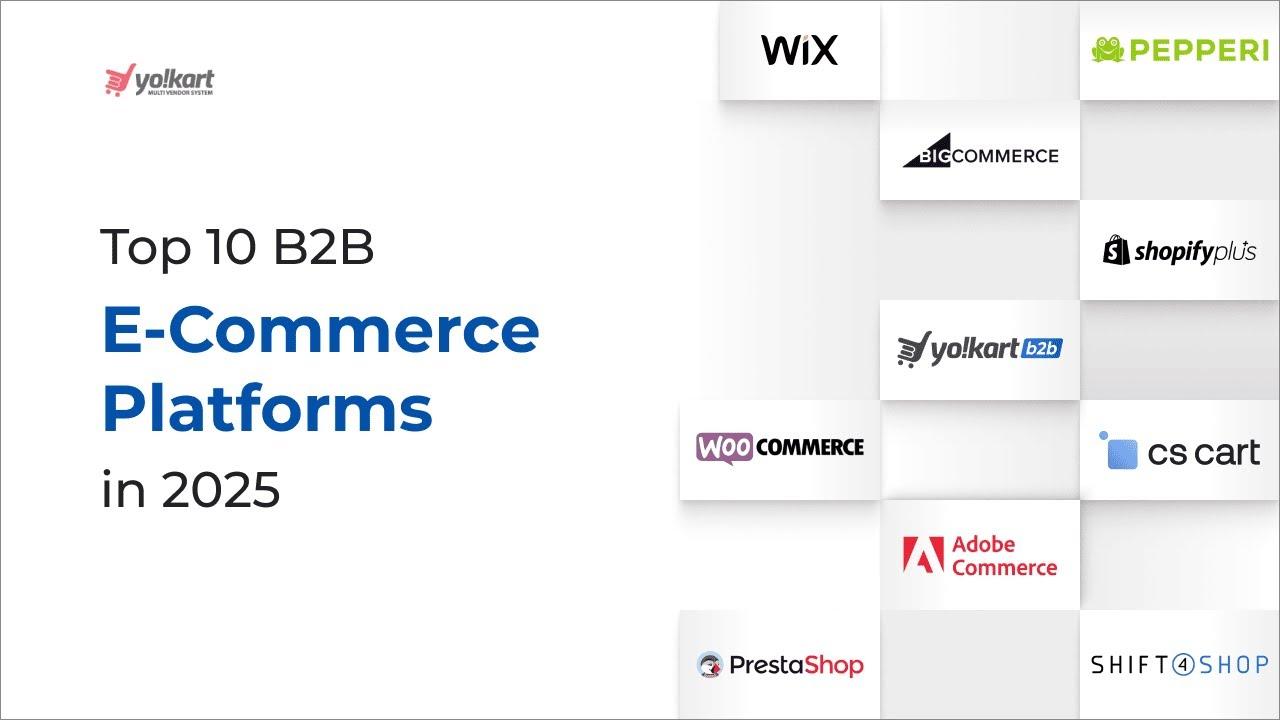
Top Platforms That Are Revolutionizing the B2B Landscape
The B2B commerce landscape is evolving at an unprecedented pace, driven by technology and changing buyer behaviors. Companies are leveraging advanced platforms that not only facilitate transactions but also enhance relationships and streamline operations. Here are some of the top platforms that are truly shifting the paradigm in B2B commerce.
Shopify Plus stands out as a robust platform designed for high-volume merchants. With its user-friendly interface and extensive range of integrations, it enables businesses to easily scale their operations. The platform’s emphasis on customization allows brands to create unique shopping experiences, which can significantly increase customer loyalty and drive sales.
BigCommerce offers a powerful solution for B2B businesses looking to expand their online footprint. Its built-in B2B features, such as customer segmentation and bulk pricing, empower companies to cater to unique buyer needs. Furthermore, the platform’s SEO capabilities ensure that products reach the right audience, enhancing visibility and revenue potential.
Magento Commerce is another heavyweight in the B2B space, providing unparalleled flexibility and control over the e-commerce experience. Brands can create tailored catalogs and personalized pricing structures, making it easier to engage with various customer segments. The platform’s robust analytics tools also equip businesses with insights needed to refine strategies and optimize performance.
| Platform | Key Features | Ideal For |
|---|---|---|
| Shopify Plus |
| High-volume merchants |
| BigCommerce |
| Growing online businesses |
| Magento Commerce |
| Established brands |
Salesforce Commerce Cloud seamlessly integrates customer relationship management (CRM) with e-commerce, enabling businesses to harness data for a personalized shopping experience. This platform is perfect for businesses aiming to create lasting connections with their clients through tailored marketing and sales strategies.
Odoo offers an all-in-one solution that encompasses everything from CRM to accounting. Its modular architecture allows companies to choose only the functionalities they need, providing a customized approach to business management. This flexibility makes Odoo a compelling choice for SMEs looking to optimize their operations without overwhelming complexity.
By embracing these innovative platforms, B2B enterprises can not only streamline their processes but also unlock new revenue streams. The combination of technology, data analytics, and personalized customer experiences is paving the way for a more dynamic and profitable future in B2B commerce.
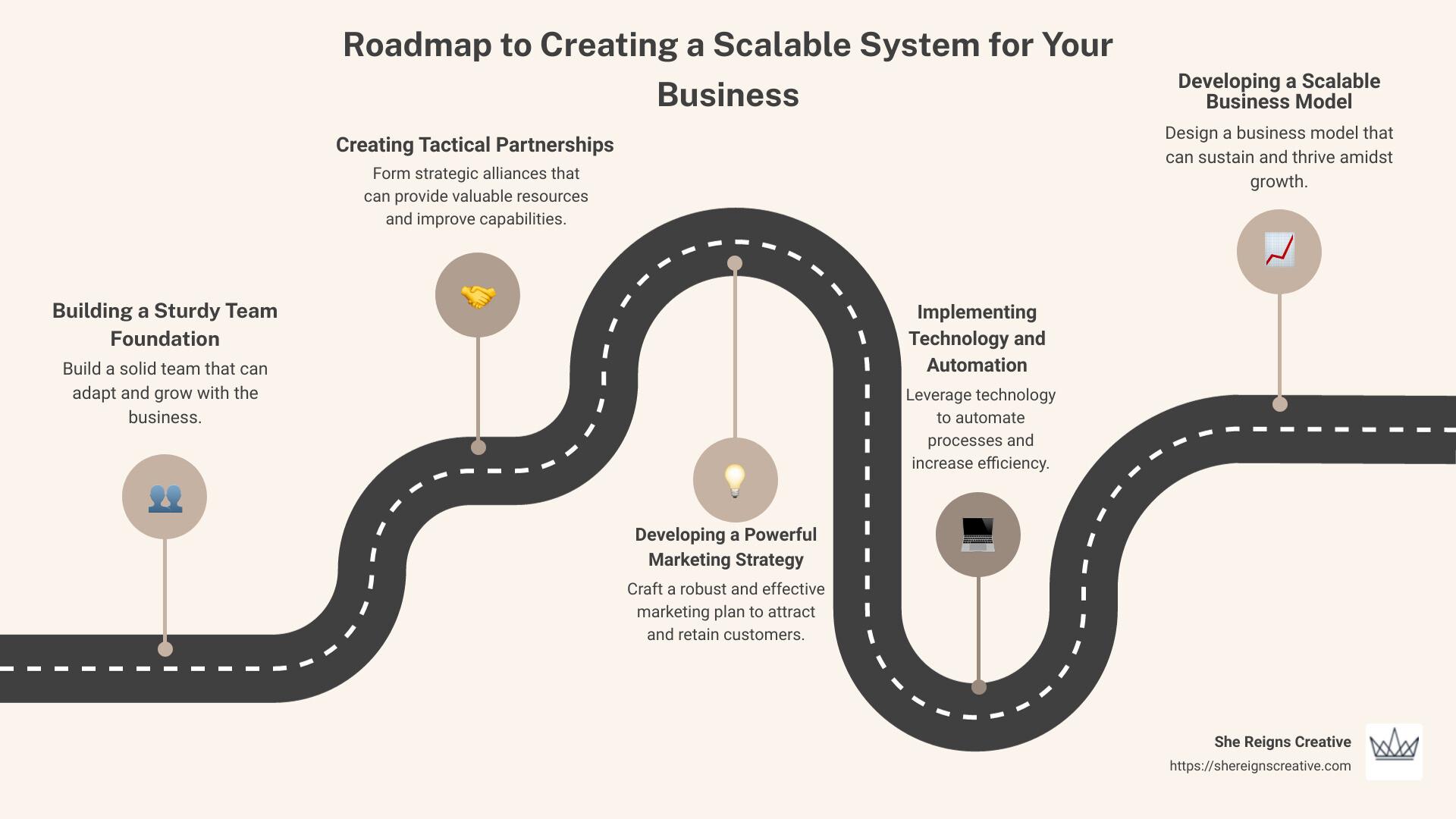
Building a Scalable Business Model with the Right Tools
In today’s fast-paced digital environment, choosing the right tools is essential for building a scalable business model. The right B2B commerce platform can not only streamline your operations but also open doors to new revenue streams. By leveraging technology effectively, businesses can enhance their customer experience, optimize their supply chain, and increase overall efficiency.
When selecting a B2B commerce platform, consider the following key features:
- Customization: Look for platforms that offer the flexibility to tailor the interface and functionalities to meet your specific business needs.
- Integration Capabilities: Ensure that the platform can seamlessly integrate with your existing systems, such as CRM, ERP, and logistics software.
- User Experience: Prioritize platforms that provide an intuitive user interface for both your team and your clients, enhancing engagement and satisfaction.
- Scalability: Opt for solutions that can grow with your business, accommodating increasing transaction volumes and expanding product lines.
- Analytics and Reporting: Choose platforms that provide robust analytics tools to help you track performance and make informed decisions.
Moreover, the importance of security cannot be overstated. With increasing concerns about data breaches, it’s vital to select a platform that prioritizes security measures. Ensure that the platform complies with industry standards and offers features such as:
- End-to-End Encryption: Protect sensitive information from unauthorized access.
- Two-Factor Authentication: Add an extra layer of security to user accounts.
- Regular Security Audits: Ensure continuous monitoring and improvement of security protocols.
To give you a clearer picture of how these platforms can benefit your business, consider the following comparison table of popular B2B commerce solutions:
| Platform | Key Features | Best For |
|---|---|---|
| Shopify Plus | Customizable, Scalable, Multi-channel | Growing Enterprises |
| BigCommerce | Built-in SEO, Integration-Friendly | Mid-Market Businesses |
| Magento Commerce | Highly Customizable, Extensive Extensions | Large Enterprises |
| TradeGecko | Inventory Management, Order Fulfillment | Wholesalers |
As you explore the myriad of options available, remember that choosing the right B2B commerce platform is not just about immediate needs; it’s an investment in your future growth. The platforms that empower your business today can provide the foundation for the innovations of tomorrow. In this competitive landscape, having the right tools will not only help you keep pace but also set the stage for unlocking new revenue opportunities.
Enhancing User Experience to Retain Loyal Customers
In the fast-paced world of B2B commerce, enhancing user experience is not just an option; it’s a necessity. Companies that prioritize customer satisfaction create a loyal clientele that drives sustainable growth. By focusing on user experience, businesses can unlock new revenue streams while keeping their customers engaged and coming back for more.
To achieve this, consider implementing the following strategies:
- Intuitive Navigation: Ensure that your platform is easy to navigate. A clean layout with clear categories and a powerful search function can drastically reduce frustration and improve the overall shopping experience.
- Personalized Experiences: Use data analytics to tailor offerings to individual preferences. By recommending products based on past purchases or browsing history, you can create a shopping experience that feels bespoke.
- Responsive Customer Support: Offering multiple channels for customer support, including chatbots, live chat, and dedicated account managers, ensures that customers can seek help whenever they need it.
- Streamlined Checkout Process: Reducing the number of steps in your checkout process can minimize cart abandonment. Consider implementing features like one-click purchasing to facilitate faster transactions.
Moreover, it’s crucial to provide comprehensive product information. This includes detailed descriptions, high-quality images, and specifications that help buyers make informed decisions. When customers feel well-informed, they are more likely to trust your brand and complete their purchases.
Another aspect of enhancing user experience is the integration of user-generated content. Encourage customers to leave reviews and ratings, as this not only builds community trust but also provides valuable insights into product performance. A platform that showcases customer feedback demonstrates transparency and fosters a sense of belonging among users.
regularly soliciting feedback from your customers can drive continuous improvement. Implementing surveys or feedback forms after purchases can help gather insights into their experiences, allowing you to adapt and refine your platform accordingly. This proactive approach shows customers that their opinions matter, reinforcing their loyalty to your brand.
| Feature | Benefit |
|---|---|
| Intuitive Navigation | Reduces frustration; enhances usability |
| Personalized Experiences | Increases engagement; boosts sales |
| Responsive Customer Support | Builds trust; improves satisfaction |
| Streamlined Checkout | Decreases cart abandonment; accelerates sales |
| User-Generated Content | Enhances credibility; fosters community |

The Importance of Omnichannel Strategies in B2B Commerce
In today’s fast-paced B2B landscape, harnessing the power of omnichannel strategies is not just beneficial—it’s essential for staying competitive. By integrating multiple channels into a cohesive customer experience, businesses can engage clients more effectively, leading to increased loyalty and higher sales conversions.
Why is an omnichannel approach crucial? It allows companies to meet their clients where they are, whether that’s through a website, a mobile app, social media, or in-person interactions. This level of accessibility ensures that businesses can provide seamless service, fostering trust and reliability. Here are several significant advantages:
- Enhanced Customer Experience: By offering various touchpoints, businesses can tailor their services to meet the unique needs of each client, enhancing satisfaction and retention.
- Data-Driven Insights: Integrating channels allows businesses to collect and analyze data more effectively, providing insights into customer behavior and preferences that can inform better decision-making.
- Greater Flexibility: An omnichannel strategy equips businesses to adapt quickly to changing market conditions and consumer trends, ensuring they can pivot their offerings when necessary.
- Increased Revenue Opportunities: A unified approach can lead to cross-selling and upselling opportunities that might be missed with a single-channel focus, ultimately boosting the bottom line.
Furthermore, implementing omnichannel strategies can significantly enhance collaboration within sales teams. When all departments have access to the same customer data and insights, it fosters a more synchronized approach that can lead to creative solutions and improved performance.
To illustrate the impact of these strategies, consider the following table that highlights the potential benefits of adopting an omnichannel approach versus a single-channel approach:
| Feature | Omnichannel | Single-Channel |
|---|---|---|
| Customer Reach | Wide and varied | Narrow and limited |
| Data Utilization | Integrated and comprehensive | Fragmented and sporadic |
| Customer Engagement | High and personalized | Low and generic |
| Sales Growth | Consistent and sustainable | Variable and unpredictable |
embracing an omnichannel strategy in B2B commerce is no longer a choice but a necessity. Companies that recognize this shift will not only unlock new revenue streams but also build lasting relationships with their customers, positioning themselves as leaders in the industry.
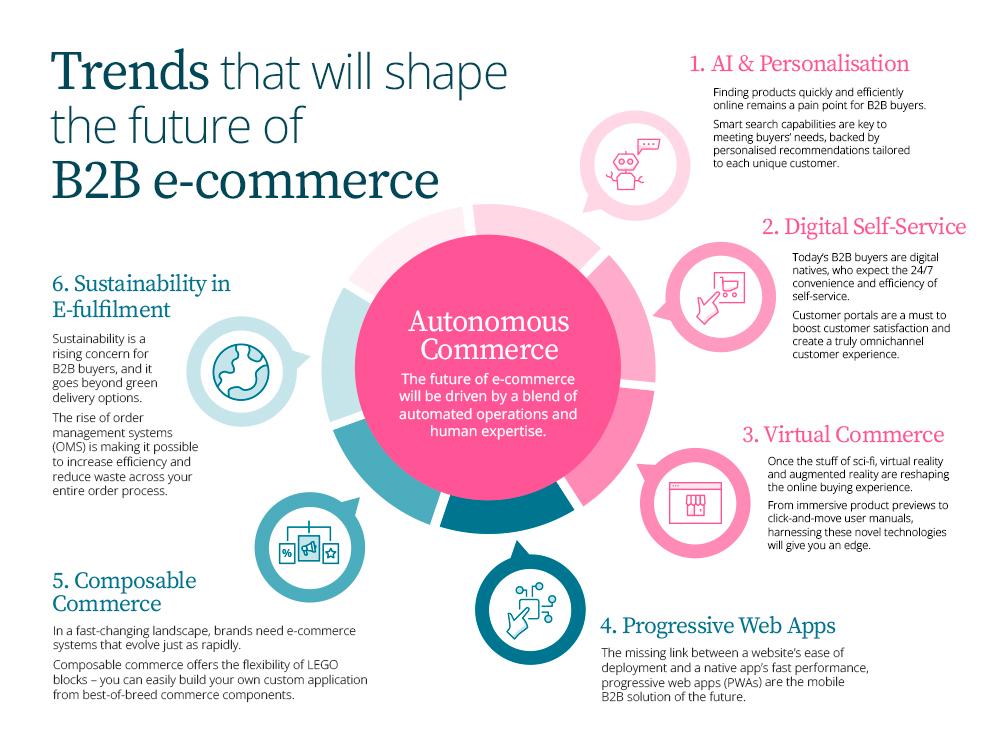
Real-World Success Stories from Leading B2B Brands
In today’s competitive landscape, the right B2B commerce platform can transform a brand’s approach to revenue generation. Here are some inspiring success stories that highlight how leading companies harnessed these tools to drive growth, streamline operations, and enhance customer experience.
1. ABC Manufacturing: Streamlining Operations for Increased Efficiency
After integrating a robust B2B commerce platform, ABC Manufacturing saw a remarkable 30% reduction in order processing time. The platform’s automation features allowed them to eliminate manual errors and improve order accuracy. As a result, they not only increased customer satisfaction but also boosted repeat orders.
2. Tech Solutions Inc.: Elevating Customer Experience
By adopting a B2B commerce solution, Tech Solutions Inc. enhanced their customer journey significantly. They implemented personalized dashboards and advanced analytics, leading to a 25% increase in upsell opportunities. Their clients could now access tailored product recommendations, making their purchasing decisions faster and more informed.
3. Global Supplies: Expanding Market Reach
Global Supplies, a company with a strong local presence, leveraged a B2B platform to reach international markets. They reported a staggering 40% growth in international sales within the first year of implementation. By localizing their content and offering multi-currency options, they were able to cater to diverse customer needs across borders.
4. Creative Agency: Fostering Collaboration
Creative Agency adopted a B2B platform that emphasized collaboration. They introduced features that allowed clients to access real-time project updates and feedback mechanisms, resulting in a 50% faster project turnaround time. Their clients appreciated the transparency, leading to stronger long-term partnerships.
Key Takeaways from These Success Stories
- Efficiency is Key: Automating processes can drastically reduce time and errors.
- Customer-Centric Approaches: Personalization and analytics are game-changers.
- Global Expansion: Emphasizing localization can unlock new markets.
- Collaboration Tools: Foster partnerships through transparency and real-time communication.
Success Metrics Overview
| Company | Success Metric | Percentage Growth |
|---|---|---|
| ABC Manufacturing | Order Processing Time | 30% Reduction |
| Tech Solutions Inc. | Upsell Opportunities | 25% Increase |
| Global Supplies | International Sales | 40% Growth |
| Creative Agency | Project Turnaround Time | 50% Faster |

Investing in Future-Proof Solutions for Sustainable Growth
In an ever-evolving digital landscape, businesses must adapt and innovate to thrive. Investing in the right B2B commerce platforms is crucial for companies looking to unlock new revenue streams while ensuring long-term sustainability. Here are some leading platforms that demonstrate agility, scalability, and robust features to propel your business into the future.
- Shopify Plus: Ideal for high-volume merchants, this platform offers extensive customization options and powerful analytics to help you optimize sales strategies.
- Magento Commerce: Known for its flexibility, Magento allows businesses to tailor their online experience, integrate with existing systems, and manage multiple storefronts seamlessly.
- BigCommerce: With a focus on B2B needs, BigCommerce provides built-in features for B2B transactions, making it easier to manage complex pricing and customer segmentation.
- Salesforce Commerce Cloud: This platform integrates customer relationship management (CRM) with e-commerce capabilities, offering a comprehensive approach to customer engagement.
- Odoo: An open-source platform that combines e-commerce with a full suite of business applications, Odoo is perfect for those looking to manage everything from inventory to customer relationships in one place.
- WooCommerce: As a plugin for WordPress, WooCommerce is highly customizable and ideal for businesses already leveraging the WordPress ecosystem.
- Oracle Commerce Cloud: A robust solution that empowers companies with advanced analytics and personalized shopping experiences, ensuring your offerings meet market demand.
- Episerver: This platform focuses on delivering personalized experiences through AI-driven insights, making it easier for businesses to connect with customers effectively.
As you consider your options, it’s essential to evaluate not only the features and capabilities of each platform but also their ability to integrate with your existing systems and scale with your growth. Future-proof solutions are characterized by their flexibility and adaptability, enabling businesses to pivot as market demands change.
| Platform | Key Features | Best For |
|---|---|---|
| Shopify Plus | Customization, Analytics | High-Volume Merchants |
| Magento Commerce | Flexibility, Multi-Storefront | Large Enterprises |
| BigCommerce | B2B Features, Pricing Management | B2B Focus |
| Salesforce Commerce Cloud | CRM Integration | Customer Engagement |
By focusing on these innovative platforms, your business can harness the power of technology to not only meet today’s challenges but also anticipate the needs of tomorrow. In an environment where consumer expectations and market dynamics are in constant flux, the right B2B commerce platform can be the key to unlocking lasting success and sustainable growth.

Choosing the Right Platform for Your Unique Business Needs
In today’s rapidly evolving digital landscape, selecting the right B2B commerce platform is crucial for maximizing your business potential and unlocking new revenue streams. Each platform offers unique features that cater to different business models, industries, and customer preferences. To find the best fit for your organization, it’s essential to evaluate your specific needs and objectives thoroughly.
When assessing potential platforms, consider the following factors:
- Scalability: As your business grows, your platform needs to grow with you. Look for solutions that can handle increased traffic and transactions without sacrificing performance.
- Integration Capabilities: The ability to seamlessly connect with your existing systems—such as CRM, ERP, and inventory management—is vital for operational efficiency.
- User Experience: A user-friendly interface can significantly enhance customer satisfaction and retention. Choose a platform that offers intuitive navigation and customization options.
- Support and Resources: Robust customer support and a wealth of resources—like tutorials and community forums—can make a world of difference when you encounter challenges.
Moreover, industry-specific functionalities can be a game changer. Some platforms excel in particular sectors, offering tailored features that might better serve your business needs. For example, if you’re in the manufacturing sector, look for platforms that support complex product configurations and bulk ordering.
Another crucial aspect is the payment processing options. Ensure that the platform supports various payment methods, including credit cards, digital wallets, and even cryptocurrency. This flexibility not only caters to a wider audience but also enhances transaction security.
To visualize your choices, here’s a simplified comparison of key features across popular B2B commerce platforms:
| Platform | Scalability | Integration | Support |
|---|---|---|---|
| Platform A | High | Excellent | 24/7 |
| Platform B | Medium | Good | Business hours |
| Platform C | High | Fair | Limited |
| Platform D | Low | Excellent | 24/7 |
Ultimately, the right B2B commerce platform should align with your overarching business strategy. By investing time in research and evaluation, you can make an informed decision that not only meets your current requirements but also positions your business for future growth and success. Remember, the ideal platform is one that evolves alongside your business, supporting you at every stage of your journey.
Frequently Asked Questions (FAQ)
Q&A: Unlocking New Revenue with the 8 Best B2B Commerce Platforms
Q1: Why should businesses invest in B2B commerce platforms?
A1: Investing in B2B commerce platforms is essential for modern businesses looking to thrive in a competitive landscape. These platforms streamline operations, enhance customer experiences, and open new revenue streams. By leveraging digital tools, companies can reach a broader audience, improve sales efficiency, and capitalize on emerging market trends. In the digital age, having an effective platform isn’t just an option—it’s a necessity for growth and sustainability.
Q2: What features should I look for in a B2B commerce platform?
A2: When selecting a B2B commerce platform, prioritize features that cater to your unique business needs. Look for customizable catalog management, robust order processing, seamless integration with existing systems, advanced analytics, and exceptional customer support. A user-friendly interface and mobile responsiveness are also crucial, as they enhance both customer engagement and operational efficiency. The right features will empower your team and elevate your customer interactions.
Q3: How can a B2B commerce platform help in customer engagement?
A3: A strong B2B commerce platform enhances customer engagement by offering personalized experiences. With advanced data analytics, you can tailor recommendations, simplify the purchasing process, and provide targeted communications. Features such as self-service portals and real-time support foster stronger relationships and improve satisfaction. When customers feel valued and understood, they are more likely to remain loyal and increase their spending, ultimately driving your revenue growth.
Q4: What role does scalability play in choosing a B2B commerce platform?
A4: Scalability is a crucial factor in selecting a B2B commerce platform because your business will evolve and grow over time. A scalable platform can accommodate increasing transaction volumes, expand product offerings, and support new markets without sacrificing performance. Choosing a scalable solution ensures that your platform can grow alongside your ambitions, allowing you to unlock new revenue opportunities while maintaining operational efficiency.
Q5: Can you provide examples of B2B commerce platforms that stand out in the market?
A5: Absolutely! Here are eight standout B2B commerce platforms that are making waves:
- Shopify Plus – Known for its ease of use and extensive app ecosystem.
- Magento Commerce – Offers unparalleled customization and rich features.
- BigCommerce – Ideal for businesses seeking a flexible, cloud-based solution.
- Oracle NetSuite – Combines ERP and eCommerce for a comprehensive solution.
- Salesforce B2B Commerce – Leverages CRM capabilities for targeted marketing.
- SAP Commerce Cloud – Provides powerful tools for large enterprises.
- Odoo – An open-source platform with a wide array of integrated applications.
- Zoey – Focused on user experience, perfect for mid-sized businesses.
These platforms each bring unique strengths and can help you harness the full potential of B2B commerce.
Q6: How can I measure the success of my B2B commerce platform?
A6: Measuring success involves tracking key performance indicators (KPIs) tailored to your objectives. Monitor metrics such as conversion rates, average order value, customer retention rates, and overall revenue growth. Additionally, assess customer feedback and engagement levels to gauge satisfaction. Regularly analyzing these metrics will provide insights into your platform’s effectiveness and help you make informed decisions to drive continuous improvement.
Q7: What are the common challenges businesses face when transitioning to B2B commerce platforms, and how can they be overcome?
A7: Common challenges include resistance to change, integration issues, and a lack of technical expertise. To overcome these hurdles, start with a comprehensive change management strategy that involves training and clear communication about the benefits of the new platform. Choose a solution that offers seamless integration with existing systems and invest in professional support if necessary. Remember, embracing change is key to unlocking new revenue streams and staying competitive.
Q8: What’s the key takeaway for businesses considering a B2B commerce platform?
A8: The key takeaway is that the right B2B commerce platform is not just a technological investment—it’s a strategic move toward future-proofing your business. Embrace the digital transformation, explore the options available, and choose a platform that aligns with your goals. By doing so, you’ll unlock new revenue streams, enhance customer experiences, and position your business for long-term success in the evolving marketplace. The journey may have its challenges, but with the right platform, the possibilities are limitless!
Final Thoughts
As we conclude our exploration of the eight best B2B commerce platforms, it’s clear that embracing the right technology can be a game-changer for your business. Each of these platforms offers unique features designed to streamline operations, enhance customer experiences, and ultimately unlock new revenue streams.
In a rapidly evolving digital landscape, the ability to adapt and innovate is paramount. Choosing the right B2B commerce solution not only positions your business for immediate success but also sets the foundation for sustainable growth in the future. Picture a world where your sales processes are seamless, your customer relationships are strengthened, and your revenue potential is maximized.
Now is the time to take action. Evaluate your options, invest in the platform that aligns with your business goals, and watch as you transform your challenges into opportunities. By leveraging the power of these platforms, you can elevate your B2B operations and embark on a journey toward unprecedented success.
Don’t just keep pace with the competition—lead the way. Your pathway to unlocking new revenue starts today!




